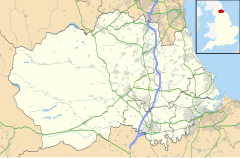Haswell, County Durham
| Haswell | |
|---|---|
 St Paul's Parish Church, Haswell |
|
| Haswell shown within County Durham | |
| Population | 1,831 (2011) |
| OS grid reference | NZ375433 |
| Unitary authority | |
| Ceremonial county | |
| Region | |
| Country | England |
| Sovereign state | United Kingdom |
| Post town | DURHAM |
| Postcode district | DH6 |
| Dialling code | 0191 |
| Police | Durham |
| Fire | County Durham and Darlington |
| Ambulance | North East |
| EU Parliament | North East England |
| UK Parliament | |
Haswell is a village in County Durham, in England. It is situated 9.8 kilometers (6.09 miles) east of the city of Durham, 14.46 kilometers (8.98 miles) south of the city of Sunderland and 5.02 kilometers (3.12 miles) north-west of the town of Peterlee.
It is notable as the birthplace of English world champion road racing cyclist Tom Simpson, born 30 November 1937.
It was also the home of the world's first coal mine as we know it, being the first in the world with a steel cable down its mine shaft. This revolutionised the coal mining industry.
Haswell once had two railway stations - Haswell railway station.
The Anglo-Saxon roots of the former farming community of Haswell are apparent in its old English name – Haesel Wella or Hessewell – meaning a hazel well or spring. Indeed, the coal trucks used at Haswell Colliery many centuries later were made of hazel bands, suggesting a hazel grove may have grown nearby. The peaceful days of living off the land disappeared in the early 19th century however, once "black gold" – coal – was discovered beneath the rural landscape.
The 1833 sinking of the first shaft at Haswell Colliery, nestled between Haswell and Haswell Plough, saw hundreds of miners from around Britain flock to the area. New houses, churches, schools, pubs and shops were all built to accommodate their needs, as well as a thriving railway station, now long gone.
But the miners' strike of 1844, however, left the village divided. Haswell – a blackleg pit – recruited "scabs" in place of union men, causing much resentment among the locals. "Things had never been worse," recalled historian Lewis Burt in The Echo back in 1964. "Unrelenting poverty was everywhere. Barefoot children begged for bread" adding "But it wasn't only the poverty, though that was bad enough, it was the recrimination, the malice, the spite, the ill-will and the hatred."
...
Wikipedia

